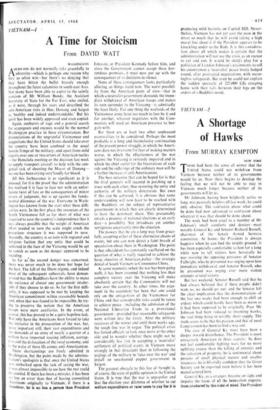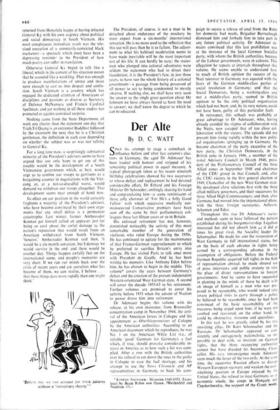VIETNAM-2
A Shortage of Hawks
' From MURRAY KEMPTON
NEW YORK
THERE had been the sense all winter that the United States could not withdraw from Vietnam because neither of its governments would let us. Now there begins to develop the feeling that we will not be able to stay in Vietnam much longer because neither of its governments will let us.
Mr Johnson, having been helplessly active so long, was passively helpless all last week; he could only observe. The confusion about what could be done had now advanced to confusion about whatever it was that should be done about.
The week had been cruel to a number of Mr Johnson's small comforts and devices—most notably General Ky and Senator Richard Russell, chairman of the Senate Armed Services committee. At home, the President is always happiest when he can find the middle ground; it has been especially comfortable to him for a long while now to tell visitors how heroically he was resisting the opposing pressures of Senator Fulbright, who he presumed was urging upon him immediate withdrawal. and Senator Russell, who he presumed was urging ever more violent attempts at total victory.
But last weekend, Senator Russell said that he had always believed that if these people didn't want us, we should get out; and the Senator left the clear implication that the demonstrations of the last two weeks had been enough to chill an ardour which could hardly have been as warm as it had been supposed to be originally. Poor Mr Johnson had been reduced to inventing hawks, the real thing being in terribly short supply. The truth seems to be that his passion and that of most Congressmen has been to find a way out.
The case 'of General Ky must have been a deeper inward disturbance. The President is most attractively American in three aspects: he does not feel comfortable fighting wars for no more uplifting excuse than the killing of enemies and the salvation of property; he is sentimental about persons of small physical stature and smaller resources; he is blissfully confident that the Great Society can be exported even before it has been manufactured here.
General Ky, as a stranger, became on sight and impulse the focus of all the benevolent expecta- tions produced by this kind of mind. The President
returned from Honolulu happy at having infected General Ky with his own urgency about political and social democracy in South Vietnam. His most conspicuous immediate result was the tele- vised execution of a summarily-convicted black marketeer—a spectacle which must have been a depressing reminder to the President of how much poetry can suffer in translation.
Otherwise General Ky began to talk like a liberal, which in the context of his situation meant that he sounded like a weakling. That was enough to produce manifestations of unrest and those were enough to cast us into despair and confu- sion. South Vietnam is a country which has engaged the dedicated attention of Americans of disciplines and passions as diverse as Secretary of Defence McNamara and Francis Cardinal Spellman; and yet nothing in all these studies has protected us against continual surprise.
Nothing came from the State Department all week any clearer than the statement one day that TrichTriQuang is an extremist Buddhist followed by the statement the next that he is a Christian gentleman, the definition in each case depending on whether the subject was or was not talking to General Ky.
For a long time now, a surprisingly substantial minority of the President's advisers seems to have argued that our only hope to get out of this trouble would be the development of a South Vietnamese government which, at best, would urge us to confine our troops to garrisons as a bargaining counter in negotiations with the Viet- cong or, at a not-so-dreadful worst, would demand we withdraw our troops altogether. That development seems near enough at hand now.
Its effect on our position in the world certainly frightens a majority of the President's advisers, who have become convinced by their own argu- ments that any small defeat is a permanent catastrophe. Last winter, former Ambassador Kennan got himself called an appeaser just for being so cool about the awful damage to the nation's reputation that would result from an American withdrawal from South Vietnam. 'Senator,' Ambassador Kennan said then, !it would be a six-month sensation, but I daresay we would survive in the end and there would be another day. Things happen awfully fast on the international scene, and people's memories are very short. If we run our minds back over the crisis of recent years and ask ourselves what has become of them, we can realise, 1 believe . . that these things pass more rapidly than one might think.'
'Believe me, we can account for YOUR Allures without a "conspiracy theory."'
The President, of course, is not a man to be detached about endurance of the mockery he must expect from a six-months' international sensation. He is no more used to the reflection that this too will pass than he is to failure. The adjust- ment to what his habitual moderation seems to have made inevitable will be the most important test of his life. It can hardly be easy; the states- men who plunged into colonial adventures were seldom the statesmen who had to direct their liquidation; it is the President's fate, in just three years. to have run the whole history of a colonial government—a passage from being possessed of all power to act to being condemned to merely observe. If nothing else, we shall have very soon the answer to the single great question about Mr Johnson we have always feared to have the need to answer; we shall know the degree to which he can be educated.



































 Previous page
Previous page